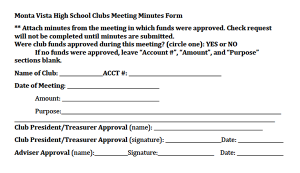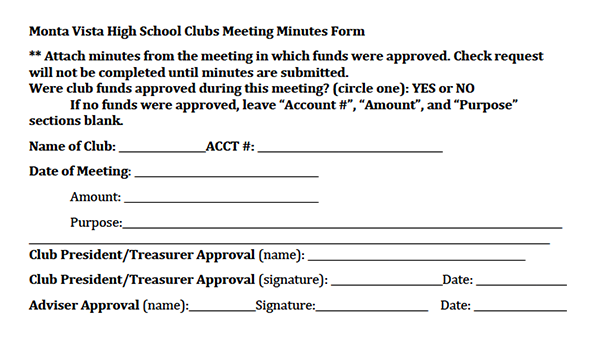New rule requires club officers to submit meeting minutes to comply with state auditing regulations but meets backlash.
[dropcap1]A[/dropcap1]t the Club Council meeting on Feb. 11 in the auditorium, Club Commission announced a new requirement for clubs: that “all meeting minutes must be submitted within one week of the meeting date, and that check requests will not be completed if meeting minutes are not submitted.”

According to Assistant Principal Mike White, The Fiscal Crisis and Management Assistance Team is hired by California to regulate school accounting. One requirement is that funding meetings reflect expenditures, thereby making sure that check requests reflect student use. This ensures that students vote on expenditures rather than advisors using the money for non-club purposes, such as for textbooks or copiers. The new rule is to ensure compliance with state regulations.
“Now we’re requiring all clubs to take minutes during their meetings. Not just like the generic meetings, meetings where they do club business or talk about how they’re going to spend their funds,” commissioner sophomore Naomi Wang said. “So later on, if you want to look at the record of what they’re doing, you can just pull that out and see exactly where they’re spending their funds.”
A clarifying email from Club Commission stated that minutes must be submitted for any club meeting held solely to discuss the budget or upcoming activities, not for activities such as fundraisers, volunteering opportunities or member bonding. Clubs must turn in the minutes, attached to the above form, to ASB Financial Technician Calvin Wong.
This new policy, however, is generating some negative reactions from club officers. DECA Vice President of Competitions senior Sameera Vemulapalli believes the requirement of minutes will limit the creativity and flexibility of club meetings, and that in addition to being an unnecessary burden on clubs, Club Commission will not be able to go through all the minutes.
[blockquote]We’ve basically clarified the hazy processes that they’ve been doing for the past few years and made it a hard copy, made it clear and known to everybody. – Lead commissioner Zerreen Kazi[/blockquote]
“I see why it could be useful to the state as a whole, but I still believe there could be more effective ways to go about it,” Vemulapalli said. “Requiring clubs to have meeting minutes is not going to stop advisor spending, it’s just one way of regulating it. No one is going to be able to go through all of this, so it’s not going to have an effect.”
Despite the FCMAT rule’s presence since 2010, this is a new policy at MVHS. Lead commissioner senior Zerreen Kazi hopes to be in agreement with auditors to show that clubs use discretion when spending to match the school’s financial records. They plan to read and organize all meeting minutes in binders for the year, and will check to ensure that minutes are submitted every month (as clubs are required to meet at least once a month).
“We weren’t informed of [the policy] until this year, and it was still in the shaky process of establishing the new system, but this is just a very concrete way of doing it.” Kazi said. “We’ve basically clarified the hazy processes that they’ve been doing for the past few years and made it a hard copy, made it clear and known to everybody.”








